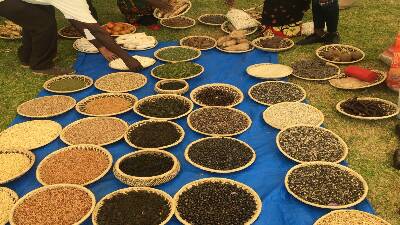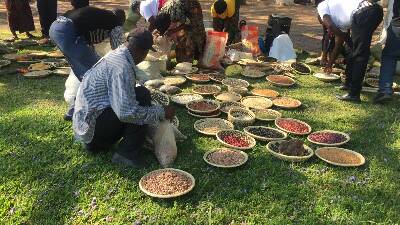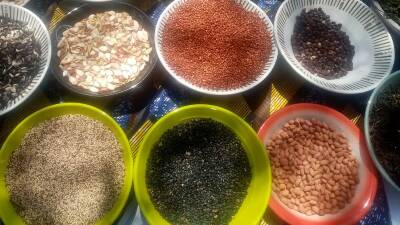Seeds Treaty must guarantee peasants’ & Indigenous Peoples' right to seeds
The International Seeds Treaty formally recognizes peasants’ and Indigenous Peoples’ rights over seeds. Governments must ensure that intellectual property and plant variety laws do not infringe on those rights. They must also prevent digital sequencing of plant genetics from leading to seed grabbing and biopiracy.
Governments attending a meeting of the Treaty’s Governing Body in New Delhi from 19 to 24 September are expected to make decisions that will have profound implications for the rights of peasant and Indigenous communities to freely grow and save their seeds. The relationship between farmers’ rights and intellectual property rights will be discussed along with the contentious issue of Digital Sequence Information (DSI). In a background paper published today, FIAN International calls on states to fully protect the rights of farmers, peasants and Indigenous people.
“If the seed industry lobby is successful, then the Governing Body may choose to legitimize the limitation of farmers’ rights through intellectual property regimes such as patents or plant variety protections laws based on UPOV, which promote and protect commercial seeds to the detriment of other seeds,” says the paper’s author Philip Seufert.
“This would have major implications for peasants and Indigenous Peoples around the world, paving the way for more seed grabbing and more criminalization of peasants and Indigenous Peoples for their centuries-old seed management practices.”
The question of seeds has never been more important, given the centrality of seeds to guaranteeing the right to food and food sovereignty in the face of the climate crisis. Transnational agribusiness corporations are making a huge push to consolidate complete control over the international seed market. They’ve continued to lobby for seed laws that criminalise communities’ seed saving practices and to expand the reach of the industrial food chain by controlling seeds.
Just four agrochemical companies – Bayer-Monsanto, DowDuPont/Corteva, ChemChina-Syngenta and BASF – control more than half of the global seed market. Intellectual property regimes have massively contributed to cementing their dominance in our food systems.
DSI, the sequencing of genetic information and its storage in digital format, is a major threat to peasants’ and Indigenous Peoples’ rights over seeds. It opens the door for a new wave of seed grabbing and biopiracy. If all the world’s seeds are sequenced and that data is made available, then the seed industry can access them and patent sequences that encode desirable traits, such as drought resistance, and use them for new plants developed with biotechnology.
If this technology is not regulated, existing safeguards to protect peasants’ and Indigenous Peoples’ rights over their seeds could be circumvented, and they could be forced to pay royalties for any seed they use which contains a patented sequence or expresses its function.
Governments have been discussing this issue for several years without coming to agreement. But in June 2022, the treaty Governing Body announced a worrying new partnership with DivSeek, an organization that promotes the use of digital sequences.
“Governments will have to decide if they are serious about farmers’ rights, or if they accept the Seed Treaty becoming an instrument for the expansion of corporate control over seeds,” adds Philip Seufert.
FIAN International calls on the Governing Body to take decisions that respect, protect and guarantee the rights of peasants and Indigenous Peoples, notably that it:
- Recognizes that peasants and Indigenous Peoples realize their rights over seeds (farmers’ rights) primarily through their own, distinct seed systems and that these need to be protected through specific national legal frameworks.
- Clarifies that peasants’ and Indigenous Peoples’ rights over seeds are human rights and reject any decision implying (explicitly or implicitly) that farmers’ rights are subject to intellectual property rights, including UPOV.
- Prevents the Treaty becoming an instrument for the pirating of seeds by the industry using DSI.
- Clearly states that DSI is not separate from the material resources/seeds from which they stem and therefore need to be treated like genetic resources. Such a decision would require the industry and researchers to comply with the rules to access seeds under the Treaty’s multilateral system, including the respect of farmers’ rights.
- Modifies the standard material transfer agreement (SMTA) to access seeds under the Treaty’s multilateral system so that the seed industry cannot patent genetic sequences that is has accessed through that system.
- Revokes the ITPGRFA’s partnership with DivSeek.
- Recommends the prohibition of patents on genetic sequences to be put in place by governments.
For more information contact Philip Seufert: seufert@fian.org
Read the background paper Farmers' Rights or Corporate Control over Seeds


